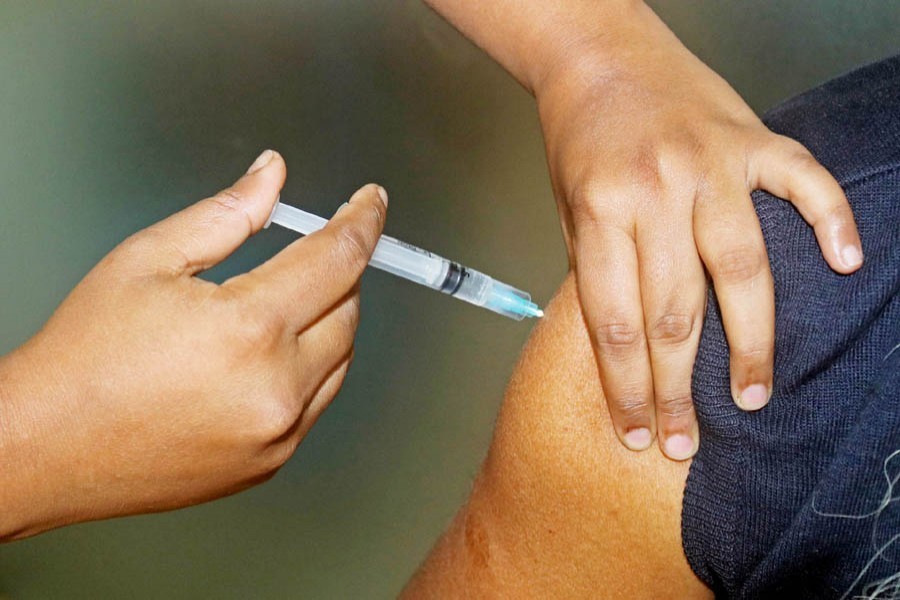
Published :
Updated :

Health experts are still insisting on facemask use, social distancing and hand wash as the SARS-Cov-2 virus continues to wreak havoc in most countries. But, for understandable reasons, the people are not comfortable with all these preventive measures, particularly that of mask-wearing. Yet they have no option but to comply with the health safety guidelines until the so-called herd-immunity is achieved.
Mass vaccination remains the key to achieving that. The development of a vaccine against Covid successfully, at least, by half a dozen pharmaceutical companies from the USA, the UK, China and Russia has offered that tool.
The rich nations wasted no time in starting vaccination of their populations. The USA, which was hit hard by the Covid-19, has already fully vaccinated nearly 37 per cent of its population. The US centre for disease control and prevention (CDC) has issued a fresh guideline advising fully vaccinated Americans to stop wearing masks and maintaining social distance in most settings - both indoors and outdoors. The scientific consensus is: fully-vaccinated people are at no risk of serious disease and have only a tiny risk of spreading coronavirus to others.
Israel, which has vaccinated more than 56 per cent of its population, was the first country to allow its citizens to start a normal life and business activities.
We also had a hope to start a normal life early. Bangladesh was among a few countries that could start vaccination programme quite early. The government had struck a deal with the Serum Institute of India (SII), the world's largest vaccine producer, to import 30 million doses of Covishield, the Indian version of Oxford-AstraZeneca vaccine for six months, ending in June next. The government through the local pharmaceutical giant Beximco paid the price of the vaccine in full. The government had a plan to buy more than 30 million doses of the vaccine from the SII.
The government's vaccination programme had started well. Authorities received plaudits from all quarters for running a well-managed vaccination programme.
But things went wrong in March last when the SII stopped delivery of the vaccine after making available only 7.0 million doses. The vaccine maker expressed its inability to despatch more vaccines following a ban imposed by the Indian government on vaccine export. The ban was imposed as India had faced its worst spike in Covid infection.
The government had received another 3.2 million doses of the Covishield vaccine as a gift. It has already stopped giving the first jab. A large number of people would not get their second dose because of the vaccine shortage.
Undoubtedly, this is a troubling situation. The government has faced criticism for depending on a single source for getting the vaccine. It was caught off-guard by the development. Yet, without wasting any time, the government started exploring alternative sources of vaccines. Talks are on with China and Russia in this regard.
The failure to supply vaccine by SII, thus, has put Bangladesh in serious difficulty. For genuine reasons, it has given rise to frustration among the people who are willing to be vaccinated as early as possible.
As uncertainty looms over the availability of vaccine, the parliamentary standing committee on the Ministry of Foreign Affairs has reportedly suggested examining the possibility of taking legal actions against the SII.
The SII and the Beximco Pharmaceuticals in August last year signed a memorandum of understanding on the marketing of the Covishield vaccine in Bangladesh. The MoU later led to the signing of the purchase deal.
The deal, reportedly, contained a clause that extends indemnity to either of the parties if they suffered a loss due to an unforeseen situation. There is also the force majeure clause that covers the issue of imposing restrictions by the governments. The details of the vaccine procurement deal, however, have not been made public.
The trouble with vaccine export by the SII originated from some other reasons. The SII could not produce enough vaccines because of a shortage of certain essential ingredients, imported from the USA. The latter invoked the Defence Production Act to stop the export of the said ingredients. The SII wrote to the Indian government in the first week of March last to facilitate the uninterrupted supply of the same. When the Institute struck deal with Bangladesh, possibly, it was experiencing problems with vaccine production in sufficient volume.
The European Union members were also facing identical problems over the supply of the AstraZeneca vaccine. When vaccine producer failed to keep their commitment, the EU was about to sue AstraZeneca. However, both parties settled the dispute through negotiations.
The government of a sovereign country is free to take any decision. A company is also bound to comply with that. But, if that company strikes a trade deal with a company of any other country, the international trade rules come into play there. The affected party holds the right to take recourse to legal action.
The ongoingCovid situation in India is dreadful. It needs to vaccinate its population urgently the way Bangladesh does. India has so far got 3.0 per cent of its population fully vaccinated, while the same is only 2.2 per cent in the case of Bangladesh.
It seems that SII would not be able to soon resume the export of vaccines to Bangladesh. But the government needs to press its Indian counterpart to make available the vaccines enough to give the second jab.


 For all latest news, follow The Financial Express Google News channel.
For all latest news, follow The Financial Express Google News channel.